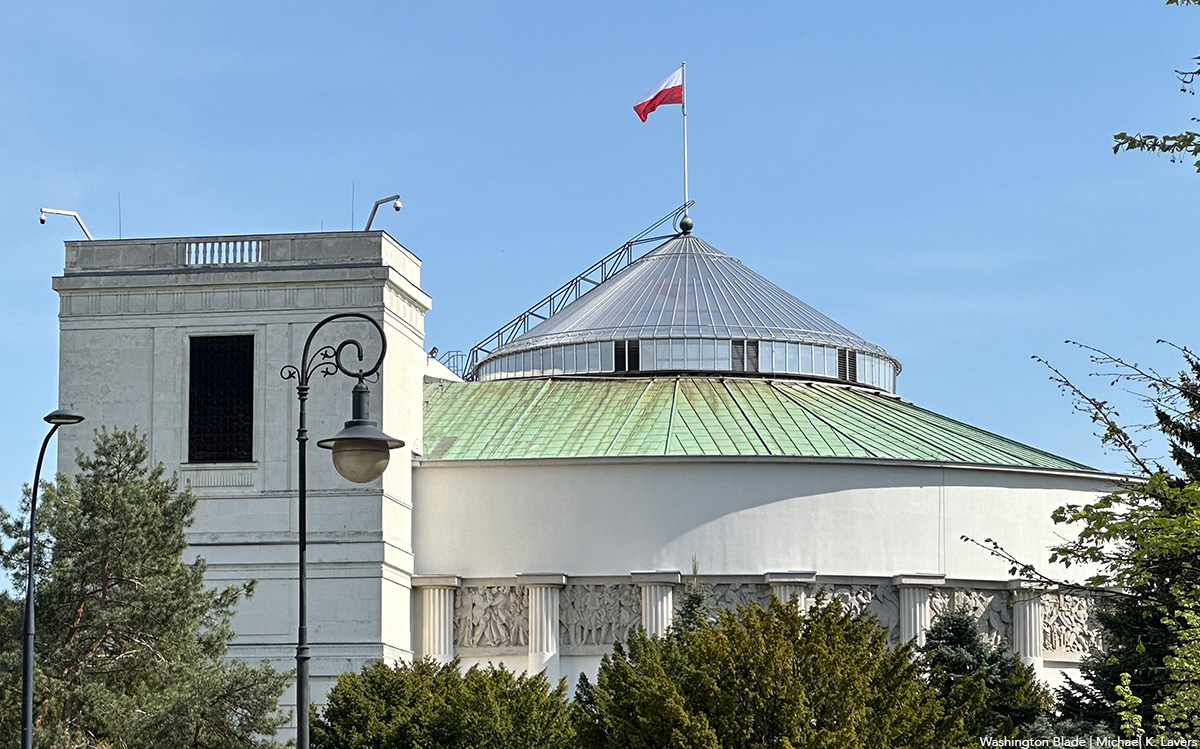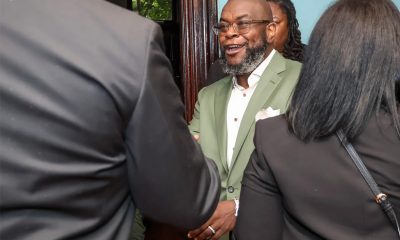World
Out in the World: LGBTQ news from Europe, Australia, and Canada
Italian lawmakers have passed a bill to ban overseas surrogacy

ITALY
The Italian Senate gave final passage to Prime Minister Giorgia Meloni’s bill to ban criminalize the use of surrogacy overseas, in what LGBTQ activists are saying is a direct attack on same-sex parents.
Surrogacy is already illegal in Italy. The new law cracks down on parents who travel out of the country to obtain surrogacy services where it is legal, like the U.S. or Canada. Under the new law, such parents could be subject to fines of up to €1 million (approximately $1.1 million) or imprisonment for up to two years.
While the vast majority of Italians who engage in overseas surrogacy are heterosexual couples, activists fear the law will be used specifically to target male same-sex couples, who cannot simply pretend not to have used a surrogate.
That would fit with a pattern of attacking same-sex parents since Meloni took office in 2022. Last year, her government issued an order directing municipalities to delete non-biological same-sex parents from birth certificates that had already been issued to children. That decision was condemned by the European Parliament and other world leaders.
Protesters demonstrated in front of the Italian Senate during the debate, carrying signs that read “We are families, not crimes.”
Meloni has long argued for banning surrogacy as a women’s rights issue, claiming that surrogacy commodifies women’s bodies.
She called the law “a common-sense rule against the commodification of the female body and children. Human life has no price and is not a commodity,” in a post on X.
“The alleged defense of women, the vaunted interest in children, are just fig leaves behind which the homophobic obsession of this majority is hidden,” says Laura Boldrini, an opposition lawmaker.
In many places where surrogacy is legal, it is only legal for altruistic, rather than commercial reasons. Surrogates can be reimbursed for legitimate expenses but cannot be otherwise compensated. That’s how surrogacy works in Canada and Australia.

POLAND
The Polish government introduced its long-awaiting civil union legislation last week, revealing that the government has dropped plans to allow couples in civil unions to adopt children in a compromise meant to get the bills through parliament.
Prime Minister Donald Tusk had pledged to introduce same-sex civil unions within his first 100 days of taking office last year, but that pledge faced numerous roadblocks as the outgoing government initially refused to cede power, and then more conservative parts of his three-party coalition balked at expanding LGBTQ rights.
The bills would allow same-sex and opposite-sex couples to register their partnerships, giving partners rights to inheritance and medical decision-making.
But couples in civil unions would not be allowed to jointly adopt, nor would one partner be allowed to adopt the other’s biological children.
That was a key demand of the junior coalition partner, the Poland Peasants’ Party (PSL). The bills are unlikely to gain any support from the opposition Law and Justice Party or Confederation Party, both of which strongly oppose LGBTQ rights.
The bills may still face opposition from President Andrzej Duda, an ally of Law and Justice who has opposed LGBTQ rights in the past. He has not publicly commented on the bills.
Duda’s term expires next year, and all parties are attempting to position themselves in the election for his replacement, expected in May 2025.
CANADA
Provincial elections in British Columbia remained too close to call a day after polls closed on Oct 19, with the incumbent New Democratic Party leading or elected in 46 seats, while the rival BC Conservatives, who had campaigned on scrapping an anti-bullying program that promoted awareness of LGBTQ people in schools, were leading or elected in 45 seats. The BC Greens were elected in two seats.
Elections BC says it could be a week before results are finalized, due to a number of very close races and the number of mail-in and out-of-district ballots yet to be counted.
If the BC Conservatives lose, it would be the second loss of a provincial election in 2024 for a conservative party that had run on a platform of restricting sex education, discussion of LGBTQ issues, and inclusion of trans kids in schools, after the Manitoba Progressive Conservatives were booted from office in June.
Two more Canadian provinces are heading to the polls in the next week, and in both races, incumbent conservative parties are defending newly introduced policies that require schools to out trans students to their parents and require parental consent if a child wishes to use a different name or pronoun in school.
In New Brunswick, voters head to the polls today, and the incumbent Progressive Conservatives are facing a strong challenge from the New Brunswick Liberals. Liberal leader Susan Holt has promised to scrap the parental-notification policy and put safeguards in place for LGBTQ students if elected.
Saskatchewan Premier Scott Moe has promised to double-down on anti-transgender policies if re-elected Oct 28. This week, he said his first order of business would be passing a policy restricting school change rooms based on sex assigned at birth.
Saskatchewan NDP leader Carla Beck slammed the proposal.
“People see this for what it is,” Beck told a press conference. “It’s the ugliest gutter politics. I think people are tired of it.”
Canadian conservatives have been turning hard against trans people over the past couple of years, reflecting similar culture war divisions in the U.S. and the UK, despite a general consensus on equal rights for trans people that had developed over the previous decade. In fact, Scott Moe was a Cabinet minister in the Saskatchewan Party government that passed that province’s ban on gender identity discrimination.
Meanwhile, in neighboring Alberta, Premier Danielle Smith has proposed a package of legislation that would require parental notification and opt-in for any discussion of sexual orientation or gender identity in classrooms, as well as severely restricting access to gender care for trans youth. The bills are expected to be debated in the upcoming fall session of the legislature.
AUSTRALIA
The New South Wales state legislature passed a bill meant to promote LGBTQ equality on Thursday, but only after it had been watered down in order to gain support from the governing Labor Party.
Independent lawmaker Alex Greenwich had originally proposed a comprehensive bill that would have addressed multiple areas of law that discriminate against queer people.
A key provision would have repealed a loophole in state anti-discrimination law that allows religious schools to discriminate against LGBTQ students and teachers. That provision was dropped.
Greenwich’s original bill also would have established an affirmative right to gender-affirming care and would have decriminalized sex work. Both provisions were also dropped.
Greenwich says his bill faced concerted opposition from religious organizations and he removed the provisions in order to get the bulk of the bill’s reforms passed.
“It’s heartbreaking that I’m in a position where I’m having to remove a reform that I have fought for my entire political career,” Greenwich told ABC News Australia. “There has been a concerted campaign, particularly by some religious organizations, and I’m not wanting to hold up some urgent reforms while we’re still working this through.”
The parts of the bill that have been salvaged are still important reforms for LGBTQ rights.
The bill will update domestic violence laws to apply to same-sex couples and recognize parenting rights for children born through surrogacy overseas. It will also allow trans people to update their legal gender on birth certificates without undergoing surgery — an important reform that is already the norm in the rest of Australia. Nonbinary or non-specified will also be options.
The bill also repeals offenses related to living off the earnings of a sex worker, makes it a criminal offense to threaten to out a person, and adds hate crime protections for trans people.
This year, New South Wales’s Labor government earned plaudits from LGBTQ activists for passing a bill banning conversion therapy, and issuing a historic apology to people persecuted under old anti-LGBTQ laws.
Earlier this year, Australia’s governing Labor Party dropped its promised reform to federal anti-discrimination laws to repeal a loophole allowing anti-LGBTQ discrimination in schools, following backlash from religious groups.
Argentina
LGBTQ seniors in Argentina face uncertain future
President Javier Milei’s policies have disproportionately impacted retired pensioners

Editor’s note: International News Editor Michael K. Lavers will be on assignment in Argentina and Uruguay through April 12.
Argentina has undergone significant changes in its economic and social policies since President Javier Milei’s inauguration in December 2023. These changes have had a significant impact on various sectors of society, especially retirees and the LGBTQ community.
Mercedes Caracciolo, a 79-year-old sociologist and lesbian activist, shared her experience with the Washington Blade on how the new measures have affected her quality of life.
“Since Milei’s arrival in government, which began with a brutal devaluation, I am more careful in my spending than I was before,” she said.
Although Caracciolo has additional income from rental properties, she recognizes the situation is much more critical for those who exclusively depend on a pension.
With more than 7 million people receiving pensions, many find themselves “scratching the poverty line” due to the loss of purchasing power. The libertarian government’s economic policies have drastically affected their welfare, leading to a wave of protests across the country.
The reduction of social programs and the lack of LGBTQ-specific public policies have deepened the difficulties that seniors already face. The loss of economic stability particularly affects those who have historically lived on the margins, with fewer job opportunities and limited access to a decent retirement. Many older LGBTQ people, who have spent their lives unable to form traditional families, now find themselves without a support network and with an increasingly less present State.
The advance of conservative discourses has also generated a climate of insecurity and fear.
“There is no more sense of security and stability in old age,” Graciela Balestra, a psychologist who is the president of Puerta Abierta a la Diversidad, the first home for LGBTQ seniors in Argentina, explained. “Many LGBTQ+ retirees fear that there are fewer and fewer rights. They see what is happening in Argentina and globally with the advance of the right wing, and they feel that what they worked so hard to achieve is in jeopardy.”
In addition to economic difficulties, the LGBTQ community has faced additional challenges.
Caracciolo noted many supportive spaces have had their government subsidies reduced or eliminated, weakening community networks essential to the well-being of LGBTQ seniors.
“Community networks are also weakened because many of them require state support for certain types of expenses,” she noted.
Balestra warned about the psychological impact.
“Obviously it impacted mental health. There is much more anxiety, there is fear. People who say ‘I’m afraid they’ll kill me’ or ‘I’m afraid to show myself,'” she said. “Before, they used to walk down the street holding hands with their partner, and now they don’t do it anymore. A lot of hopelessness.”
For Balestra, the concern goes beyond the LGBTQ community.
“The economic issue, the rights issue, the fear that something similar to the dictatorship will return. All of this is very scary. And besides, the hopelessness of believing that this is going to continue, that it is not going to change even in the next elections,” she said.
Civil society organizations have denounced an “adjustment” in policies related to gender and diversity that Milei’s government has undertaken. Pride marches in Argentina have become a stage for protests against the president’s policies, especially over his speeches that activists consider hateful towards the LGBTQ community.
Balestra stresses the fear is not only individual, but collective.
“Human rights no longer exist anywhere, women no longer have the place they used to have, they are once again objectified, machismo is on the rise again,” she said. “This brings a lot of despair to older people.”
Despite the climate of uncertainty, Balestra emphasizes resistence forces are still in force.
“We continue working, as always,” she said. “For 25 years at Puerta Abierta we have been doing reflection groups, cultural workshops, social meetings, all with respect to being able to make LGBT people aware of their rights. We never stop meeting, but lately we are talking more and more about these things that we had already left a little behind. The issue of coming out, fear, visibility. Now we have to talk about it again.”
Africa
Report: Anti-LGBTQ discrimination has cost East African countries billions
Open for Business highlights Kenya, Uganda, Tanzania, and Rwanda

The economies of four East African countries are losing more than $5 billion a year because of discrimination against LGBTQ people.
The 80-page report that Open for Business, a coalition of leading global organizations that champion LGBTQ inclusion, released in late March focuses on Kenya, Uganda, Tanzania, and Rwanda. It attributes the losses to anti-homosexuality laws, and predicts more economic costs if lawmakers implement other harsh anti-LGBTQ measures.
The report notes Uganda is losing $2.4 billion, or 5.2 percent of its GDP, annually because of the Anti-Homosexuality Act that took effect in 2023. Open for Business last October revealed the country had already lost $1.6 billion in foreign direct investment, donor aid, trade, tourism, public health and productivity after President Yoweri Museveni signed the law.
Kenya is losing $1.5 billion, or 1.38 percent of its GDP.
The report warns that enacting the pending Family Protection Bill would cost the country an additional $6.3 billion, or 5.8 percent of its GDP, annually. Opposition MP Peter Kaluma, who has introduced the measure, in January claimed the Biden-Harris administration had blocked it and vowed to have fellow MPs pass it after U.S. President Donald Trump’s inauguration.
Kaluma is a strong supporter of Trump and the Republican Party’s opposition to LGBTQ rights and other far-right conservative ideologies.
Tanzania is losing $1.1 billion, or 1.33 percent of its GDP, because of anti-LGBTQ discrimination. Rwanda is losing $45 million, or .32 percent of its GDP.
Homosexuality is not illegal in Rwanda unlike the other three countries, but consensual same-sex sexual relationships remain taboo. Queer Rwandans also face stigma, discrimination, social exclusion, and arbitrary detention.
“A series of private member bills in Uganda, Kenya, and Tanzania have threatened to pull the region back in terms of progress and human rights for LGBTQ+ people, and damage both the ease of doing business and their international reputation,” states the Open for Business CEO Dominic Arnall.
Arnall notes his organization’s extensive engagement with businesses across East Africa over the last five years has always linked harmful anti-LGBTQ laws to impacts on a country’s investment prospects.
“The finding lays bare an uncomfortable truth: That laws that harm the LGBTQ+ community are standing in the way of prosperity and growth for all citizens in the region,” he said.
The report calls for LGBTQ inclusion as part of the region’s broader economic development agenda.
The Open for Business report notes anti-gay violence and discrimination in Tanzania has been on the rise since the late-President John Magufuli came to power in 2015. The country’s punitive anti-homosexuality law with a 30-year prison sentence for consensual same-sex sexual relations was already in place, but queer Tanzanians were generally not systematically targeted.
“Reporting of neighbors or community members for suspected homosexuality is frequent and law enforcement officers have been known to pose as members of the LGBTQ+ community to entrap and blackmail LGBTQ+ individuals,” states the report.
It also notes the Tanzanian government’s crackdown on websites and social media accounts that promote LGBTQ rights and threatening the arrests of administrators who allow such content. The report concludes this suppression has caused queer people to live in fear and isolation.
Religious organizations, particularly Christian churches in Tanzania, also champion anti-LGBTQ rhetoric by encouraging their followers against tolerating homosexuality and transgender people. Politicians, meanwhile, use anti-LGBTQ narratives to gain support during campaigns.
While Rwanda stands out as the only East African country in which homosexuality is not criminalized and has foreign donors implementing programs that target the queer community, discussing LGBTQ rights in public is rare and same-sex relationships are not legally recognized. The Open for Business report notes this situation creates legal ambiguity and a fragile social environment for queer Rwandans.
“Several LGBTQ+ rights organizations have emerged in recent years, mostly in Kigali, although they do not always identify themselves as LGBTQ+ associations and are rarely formally registered, making it difficult for them to receive funding,” reads the report.
The Rwandan government has rejected calls to criminalize homosexuality, which it considers a “private matter.” It has also been adamant against efforts to protect queer people for fear of domestic opposition and a desire not to politicize the issue like in neighboring countries.
Kenya, like Rwanda, has for a long time been considered more receptive of queer people, “as long as LGBTQ members are not ‘too loud.’”
Anyone convicted under Kenya’s colonial-era sodomy law could face up to 14 years in prison. Efforts to enact a harsh anti-homosexuality law and anti-LGBTQ protests that religious leaders, politicians, and activists have organized have increased homophobia in the country.
“LGBTQ individuals report significant difficulties in securing formal employment, which pushes many of them into more precarious livelihoods in the informal sector,” states the report.
Trinidad and Tobago
Trinidad and Tobago recriminalizes homosexuality
Court of Appeal on March 25 overturned 2018 ruling

An appeals court in Trinidad and Tobago has recriminalized consensual same-sex sexual relations in the country.
Jason Jones, an LGBTQ activist from Trinidad and Tobago who currently lives in the U.K., in 2017 challenged Sections 13 and 16 of the country’s Sexual Offenses Act. High Court Justice Devindra Rampersad the following year found them unconstitutional.
The country’s government appealed Rampersad’s ruling.
Court of Appeal Justices Nolan Bereaux and Charmaine Pemberton overturned it on March 25. The Daily Express newspaper reported Justice Vasheist Kokaram dissented.
“As an LGBTQ+ citizen of Trinidad and Tobago, this regressive judgement has ripped up my contract as a citizen of T&T and again makes me an unapprehended criminal in the eyes of the law,” said Jones in a statement he posted to social media. “The TT Court of Appeal has effectively put a target on the back of LGBTQIA+ people and made us lower class citizens in our own country.”
Antigua and Barbuda, St. Kitts and Nevis, Barbados, and Dominica are among the countries that have decriminalized consensual same-sex sexual relations in recent years.
The Inter-American Commission on Human Rights in 2021 issued a decision that said Jamaica must repeal its colonial-era sodomy law. The Jamaican Supreme Court in 2023 ruled against a gay man who challenged it.
A judge on St. Vincent and the Grenadines’s top court last year dismissed two cases that challenged the country’s sodomy laws.
Jones in his statement said he “will be exercising my right of appeal and taking this matter to the” Privy Council, an appellate court for British territories that can also consider cases from Commonwealth countries.
King Charles III is not Trinidad and Tobago’s head of the state, but the country remains part of the Commonwealth.
“I hope justice will be done and these heinous discriminatory laws, a legacy of British colonialism, will be removed by the British courts,” said Jones.
-

 Maryland3 days ago
Maryland3 days agoAt transgender visibility celebration, Moore called out for lack of action
-

 National3 days ago
National3 days agoDestination Tomorrow works to empower LGBTQ community
-

 Arts & Entertainment3 days ago
Arts & Entertainment3 days ago‘Think of those who have not been seen,’ Cynthia Erivo’s powerful message at GLAAD Awards
-

 Africa2 days ago
Africa2 days agoReport: Anti-LGBTQ discrimination has cost East African countries billions












